Web3 will win
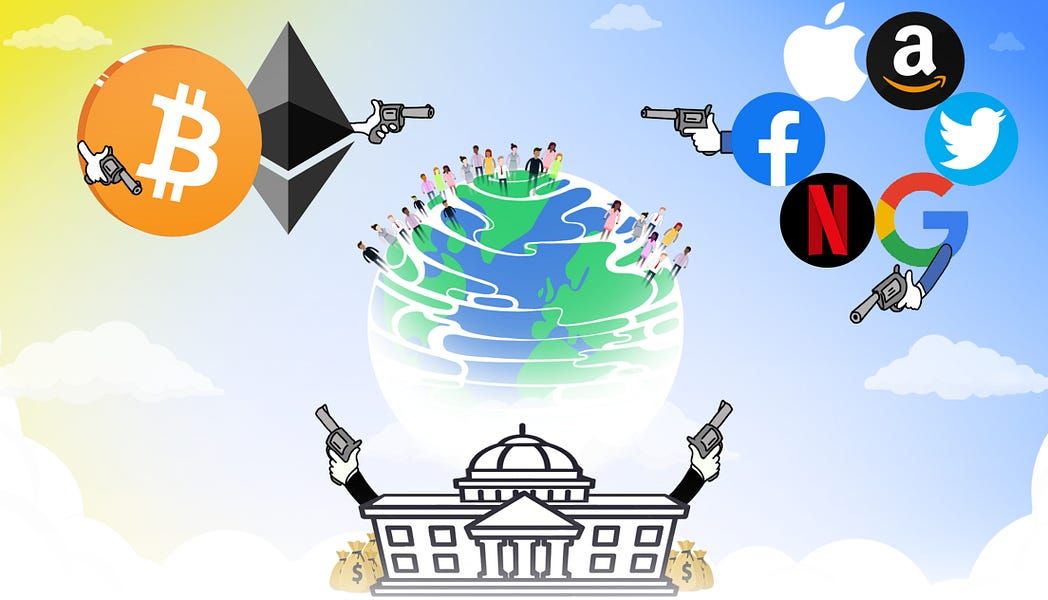
Dear Bankless Nation,
In July 2020, leaders of the big Silicon Valley tech companies were summoned to Congress for an anti-trust hearing.
Amazon’s Jeff Bezos, Apple’s Tim Cook, Facebook’s Mark Zuckerberg, and Google’s Sundar Pichai came to defend their respective company’s position as supportive of free markets and not a threat towards government power.
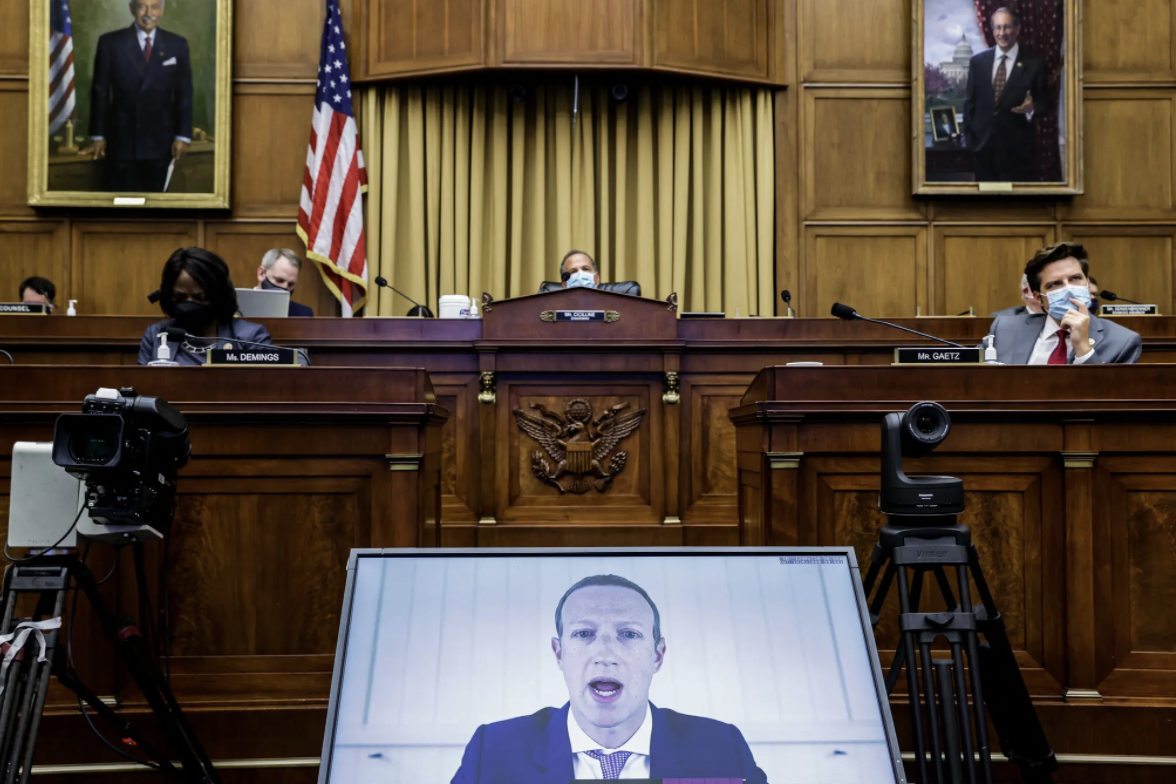
The rare interrogation played out over the course of a nearly six-hour hearing, with lawmakers on the House’s top antitrust subcommittee coming armed with millions of documents, hundreds of hours of interviews and in some cases the once-private messages of Silicon Valley’s elite chiefs. They said it showed some in the tech sector had become too big and powerful, threatening rivals, consumers and, in some cases, even democracy itself.
“Our founders would not bow before a king. Nor should we bow before the emperors of the online economy,” said Rep. David N. Cicilline (D-R.I.).
The Washington Post
While the declared purpose of anti-trust laws is to protect consumers and enable free markets, the hidden subtext is to ensure that no private entity can compete with governments on their monopoly over their citizens.
Ultimately, the Silicon Valley giants are farming the same resource that nation-states previously had a monopoly on: People.
Who has more data on people? Google or the CIA?
Who has more insight into people’s identity? Facebook or the Department of Labor?
No wonder governments want to break up all the Web2 companies; they’re all competing over the same resources: Us.
Web2 companies are faced with an inevitable dilemma. Given they way they’re built, they must continue fighting for growth and power. They need to reach all humans on the planet and pull them into their networks. When everyone uses iPhones, Apple becomes more powerful. When we’re all on Facebook, Facebook can sell its influence for a higher price. The more we use Google, the more data Google has.
Expand or die.
The goal of Web2 companies is to exert control on as much of the planet as possible.
As you could imagine, governments do not like this. Governments must be the top dog. They must be the ultimate bestowers of social order and law. If they cannot impose order upon an entity, then the entity must be reigned in—or destroyed.
This is Social Contract Theory. Western nations are built on an implied social agreement between citizens and government, as laid out by Enlightenment-era philosophers, like John Locke, Thomas Hobbes, and Jean-Jacques Rousseau. In order to exist within the bounds of a nation, citizens must forfeit certain rights to the governmental Leviathan.
So when you see people like Mark Zuckerburg, Tim Cook, Jack Dorsey, and Sundar Pichai being summoned to Congress to be grilled by the anti-trust council, it’s not necessarily for your protection as a consumer; it’s for the protection of the established order and their dominion over our lives.
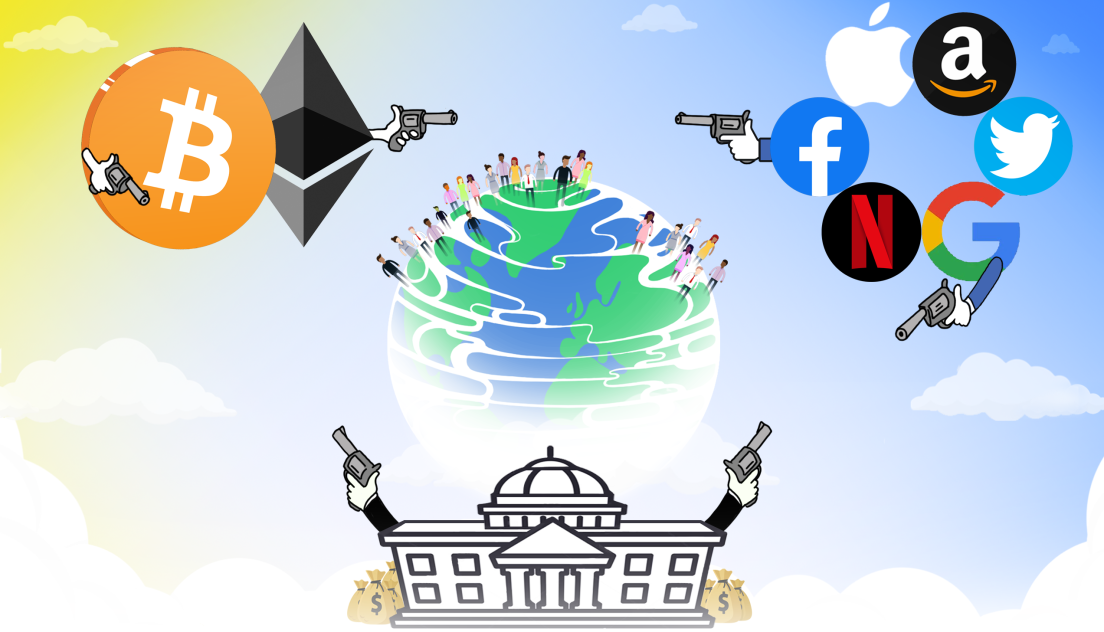
Web3: Distributing Power by Default
Last week, stewards of the Ethereum Name Service protocol issued and distributed 25% of their ENS governance token to over 137,000 different individuals, representing over $1.25B in value to users. Another 25% was distributed to ~500 individuals who were involved in the creation and maintenance of the ENS system and 50% remains in the community treasury.
Last year, Uniswap similarly airdropped 60% of its issued tokens to over 140k individual wallets that had interacted with the Uniswap application.
To many, these appear like simple distributions of capital to the users that helped grow the network. And they are. But if you remember our podcast episode with Joel Monegro, capital is power, and as Uncle Ben taught us, with great power comes great responsibility.
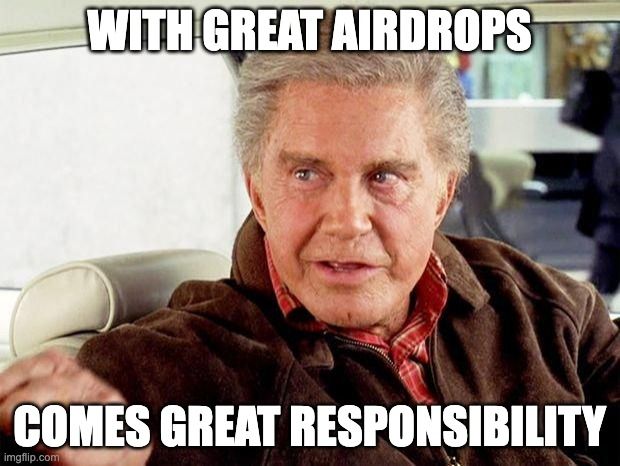
Web2 to Web3: A Magnitude of Juxtaposition
Think about how crazy the juxtaposition between Web2 and Web3 is.
The last thing a monopolistic Web2 technology company would ever want to do is break itself up. These Web2 leaders will fight tooth and nail, spin any narrative, or tell any story about how they don’t have the power that governments fear they do. They want the government to believe that they’re totally under threat of disruption from competitors and in a constant fight for consumers’ money and attention.
But in reality, the products that these Web2 gargantuans produce are their monopoly. All their products increase in value because of their monopoly status. The more monopolistic these companies are, the better their products become. To break up these companies into smaller components is antithetical to how they are constructed.
Like nation-states, Web2 companies become monopolies or they die.
In stark contrast, Web3 organizations are the exact opposite. Rather than concentrating power to the center (where the ire of a nation-state can focus upon), Web3 entities are ‘decentralize or die’.
And this reality completely changes the game on how these organizations are constructed. Uniswap distributed 60% of its power just ~3 years after its inception. ENS distributed 75% of its power along a similar timeline.
Rather than waiting for the ire of the nation-state to come knocking, it’s in the best interest of these Web3 protocols to ‘break themselves up’ sooner rather than later.
Where Web2 companies are on an inevitable collision course with nation-state interests, Web3 organizations are taking the initiative to decentralize themselves at the first available opportunity.
Where central power is integral to the success of Web2 companies, the measure of decentralization is integral to the success of Web3 applications.
Where Web2 leaders can be called upon to a congressional hearing, Web3 DAOs are noncorporeal.
Both Web2 and Web3 companies improve their products by operating a larger network. The larger the network, the more influential the network becomes. What is different between Web2 and Web3 is that Web3 networks own the product.
In our podcast with Chris Dixon, he talked about how the Corporation ↔️ Network combination is fundamentally misaligned. Users feel the misery of this misalignment; everyone now knows that this profit-maximalism of social networks generates mental health issues upon its users.
Meanwhile, tokens are the newfound “native asset of information networks”. Where the Corporation ↔️ Network combination is company-first and extractive, the Token ↔️ Network comb is user-first and generative.
The Emperor Has No Clothes
Web3 entities are proactively doing the things that government leaders are asking Web2 companies to do: break up central power and push it to the margins.
In our view, governments should be thrilled with this!
There’s this disruptive new technology that finally has the means to compete with the Web2 giants of the world! Finally! Hooray! Maybe the free market can solve our concerns of centralized power in Web2!
Sadly, this is not the reaction you see out of our government leaders. Instead, you see a denial of the concept of decentralization and attempts to spin a narrative of illegitimacy upon the entire industry. Shadowy super coders!
So why are so many government leaders so hostile to crypto?
My answer? It was never about protecting consumers, it was about protecting the current structures of power. Anti-trust are laws that prevent any entity from growing large enough to threaten the nation-state. Anti-trust laws are saying “No, you can’t have a monopoly. That would threaten our monopoly. Therefore, we will break you up if you fly too close to the sun”
Web3 organizations generate the same threats to nation-state power that Web2 companies do. The only difference is that the decentralized nature of Web3 limits the ability of nation-states to disrupt anything that threatens their power.
Why? Because decentralization is resilient, centralization is fragile. Nation-states can bring Google, Apple, and Facebook CEOs to the stand, but they can’t bring ENS, Uniswap, or Synthetix. They might be able to bring in certain people, but the actual product itself is an unstoppable, open-source protocol. It’s already out in the wild and there’s nothing anyone can do to stop it.
There are two different worlds ahead of us:
- Governments see Web3 executing on their stated anti-trust desires of inspiring free markets and consumer protections and allow them to innovate
- Governments see Web3 as a threat to their ability to maintain power over their constituency and treat them no differently than Web2 companies
Remember First Principles
Over crypto’s course of growth, I believe we will look back on government intervention and see it as an annoying mosquito buzzing in our ears. Ultimately harmless, but keeps causing us to get spooked and flail about.
Inflexible organizations like governments will eventually erode against the flowing river that is crypto. Like a river, crypto has the habit of routing around the obstacles it finds in its way, eventually wearing down anything that stands in its path.
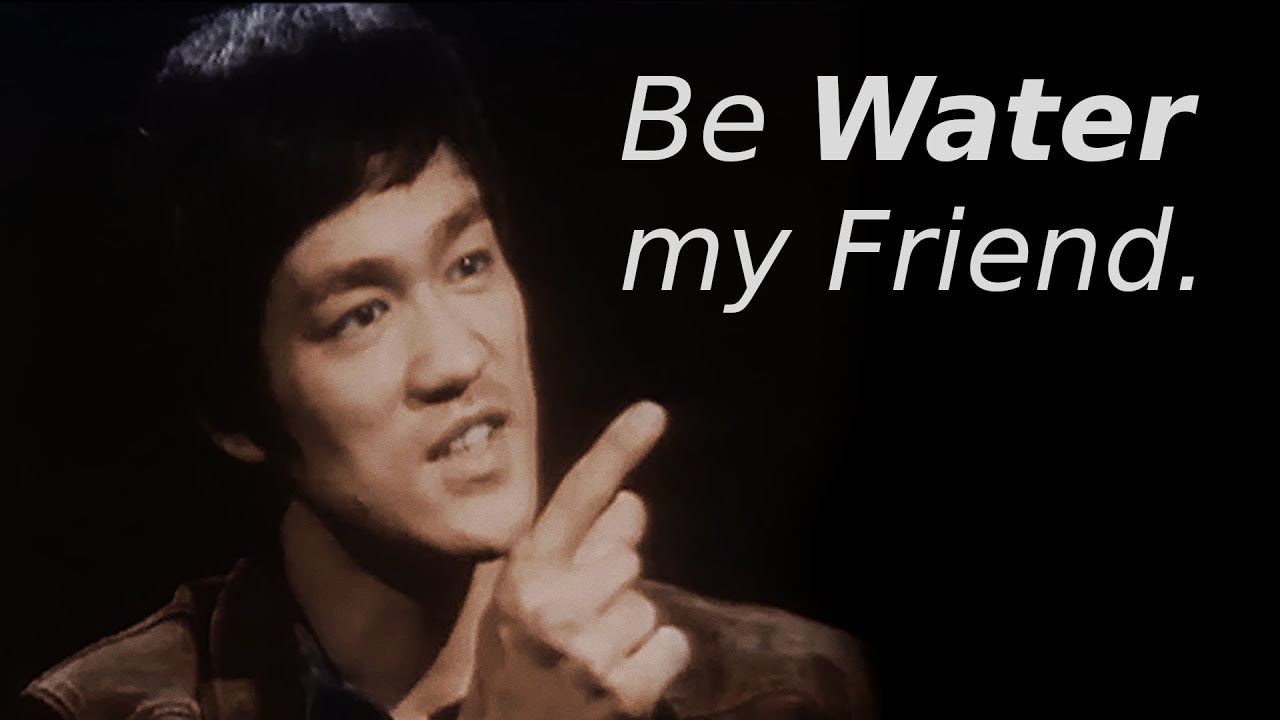
Ultimately, the state of the world is decided by the desires of the people that inhabit it, and in today’s world, the desires of the people are extremely salient.
These are the patterns that exist in the 2020s:
- Distrust in current institutions are at all-time-highs
- Wealth disparity is at all-time highs
- All of society is aware of the power that Web2 companies have over our lives
- Populism is ‘in’
- Community and camaraderie-based investing in stonks that ‘stick it to the man’
These are the patterns that exist in Web3 organizations:
- Distributing >50% of control to users and the community
- Decentralizing power sooner rather than later
- Minimizing the concentration of power of founders
- Minimal VC involvement
- Community-first organizations where the users have the power
The adoption of Web3 will occur as a reaction to the monopoly of Web2 and governments. Web3 is arriving just in time to deliver us away from the perils of the aged organization systems that previous generations created.
And thank god for that, because I’m not sure how else we would solve these problems. Global problems require global solutions.
Web3 will win for a very simple reason: it gives the people what they want.
Whether they know it yet or not, the people of the world want Web3.
Let’s bring it to them 🚀
- David
P.S. What if crypto had Onion-like satire news? Now we do. Collect Issue 1 of The Rug.
Action Steps
- Execute any good market opportunities you saw
- Listen to the first episode of Overpriced JPEGs with Betty NFT of Deadfellaz
- Browse the Bankless Jobs Board